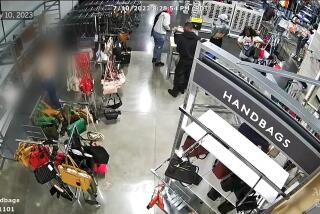British Loopholes Let Squatters Take Over Shops : Law: Officials believe there could be 60,000 residential and professional squats in England and Wales, with empty or closing businesses favorite targets.
- Share via
LONDON — When Martin Barnett tried to open his Sofa Sleepers shop one weekend morning, he said he couldn’t get in. He said squatters had moved in during the night, renamed the store the Madhouse Superstore, and began selling cheap T-shirts, women’s underwear and videos.
“It’s aggravation, sickening and disgusting,” said Barnett, who had two weeks left on his lease and was running a clearance sale when his shop was hijacked recently. Barnett’s plight is hardly unique. Professional squatters have taken over empty or closing shops in places like Oxford Street, London’s main shopping street; the fashionable King’s Road in Chelsea, and Edgeware Road, where Barnett’s shop was located.
And because of a legal loophole such a practice is not considered criminal.
Allan Sayers, chief executive of the British Shops and Stores Assn., says there have been as many as 30 professional squats at a time in London.
On a broader scale, the government’s Home Office believes there could be 60,000 residential and professional squats in England and Wales, according to a spokeswoman. She said she couldn’t break out the number of professional squats.
Under a law enacted in 1977, squatting is criminal only if violence is used to take over a premises, or if legitimate residents are prevented from living in their own home. Otherwise squatting is a civil matter, and professional squatters can stay in business for weeks while victims obtain a court injunction. Then they move on to their next squat.
In the United States, police could move quickly to evict and prosecute squatters under criminal trespass laws.
“The time has come for the law to be strengthened,” Home Secretary Kenneth Baker told the House of Commons recently. “The present law is not adequate to deal with this.”
The government is currently considering making more types of squatting criminal, punishable by six months in prison and an $8,600 fine.
The Property Managers Assn., however, advocates speeding up the civil cases as a quicker solution, according to Peter Young, the group’s president.
To keep out squatters, the Boots drugstore chain loans its empty premises to charities that sell secondhand clothing, spokesman Martin Wakeling said.
Squatters normally go after empty stores, and Britain’s recession has given them a wide choice. Small independent shops in high traffic areas are the most vulnerable.
Believed to be operating in gangs, squatters break into premises under the cover of darkness and change the locks.
If there is stock in the store, the squatters move it to the back room, and quickly bring in their own goods, said Sally Collinson, a spokeswoman for the Oxford Street Assn..
“It’s normally cheap and cheerful clothing, where you get 25 pairs of socks for a pound (around $1.75), that sort of thing,” she said.
The squatters brandish phony leases to cause confusion and delay, said Police Supt. Mike Hotson.
They have the electric service changed to their name, and keep the premises occupied 24 hours a day to prevent being dispossessed themselves, added Harry Simmonds, head of the Marble Arch Business Assn.
“It’s unsightly,” Simmonds said. “They have loudspeakers blaring all day. Of course, there’s no presentation. Everything is slung in. It’s just shoddy merchandise.”
In the case of the Madhouse Superstore, a manager who refused to give her name denied that the occupants were squatting. “We’re trying to run a business just like anybody else,” she said.
Neither she nor Barnett would provide the name of the landlord. Police took no action.
Hotson, the police superintendent, said authorities will intervene only if there is evidence of forced entry, if the existing goods have been damaged or stolen, if they believe the squatters are selling stolen merchandise, or if the squatters are ripping off the power company.
With the large number of business failures these days, “from the police point of view, it can be very difficult to find anybody who has an interest in the premises,” Hotson said.
More to Read
Sign up for Essential California
The most important California stories and recommendations in your inbox every morning.
You may occasionally receive promotional content from the Los Angeles Times.













